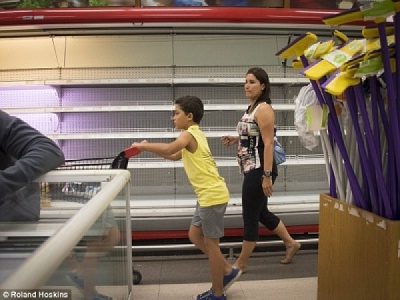
Posted on July 19, 2016
Venezuelan President Nicolas Maduro has extended the country’s state of ‘economic emergency’ for another 60 days, a sign of declining conditions in the crisis-hit country.
The state of emergency, in place since January, was necessary due to ‘extraordinary… social, economic, political, natural and ecological’ pressures, according to the presidential decree, signed by Maduro and released last night.
The declaration allows the government to seize the assets of private companies to obtain essential food and goods.
It was the third time the state of economic emergency has been extended.
Maduro said a new initiative, the ‘Great Mission of Sovereign Supply’, will be headed by Defence Minister Vladimir Padrino.
Control of the country’s five biggest ports – Maracaibo, Guanta, La Guaira, Puerto Cabello and Guamache – has been handed to General Efrain Velasco.
He has been tasked with rooting out corruption and mismanagement at the ports, where most of Venezuela’s food is imported.
Maduro said he was acting under the authority of an economic emergency decree he declared earlier this year.
But the Venezuelan Bishops Conference said the increasing handover of powers to the military was a ‘threat to tranquillity and peace’.
In May, Maduro declared a general state of emergency, broadening the scope of the economic emergency degree and allowing security units to tackle food and energy shortages and public unrest.
Maduro is clinging to power and trying to avert the total collapse of his oil-dependent country.
This week he boosted the authority of his defence minister, General Vladimir Padrino, making him responsible for distributing food, medicine and basic goods. The armed forces have also taken control of Venezuela’s five main seaports.
Luis Almagro, secretary general of the Organization of American States, said Maduro’s decision to turn key government functions over to the military is ‘not normal.’
An estimated 80 percent of food items, medicines and other basics are in short supply in Venezuela. Inflation hit 180 percent last year and the IMF has forecast it at 720 percent this year.
Critics say the problem stems from the leftist government’s model of tight grips on the economy and currency controls in place since 2003.
Maduro says he is being targeted by US interests and local business elites bent on stoking grassroots anger and removing him from power.
The Venezuelan opposition launched efforts to remove the president after winning control of the legislature in January.
But Maduro has challenged his rivals through the Supreme Court, which they accuse him of controlling.
Venezuela’s military is getting a major promotion as the socialist-run country struggles to combat severe shortages and stave off food riots.
As food shortages have worsened this year, Maduro has leaned more on the military and community groups of government supporters to organise food distribution.
He has also tried to tighten a rationing system that gives Venezuelans access to staples only on certain days.
It is not clear if the strategy is working.
Last month there was an average of 24 protests each day, according to a study published Tuesday by the local group Venezuelan Observatory of Social Conflict. About a third of the protests were sparked by severe food shortages.
Padrino, an army general and one of the few U.S.-trained officers still occupying high positions in Venezuela’s military, has long been one of Maduro’s most-trusted aides. On his first day on the new job, he vowed to bring better control and discipline up and down the food supply chain.
‘It’s not about militarizing,’ he said Tuesday. ‘I don’t like to see military intervention in areas that aren’t of military nature, but this is a question of national security and defense of the fatherland.’
The deeply unpopular Maduro is battling to fend off a recall drive in the face of an economic crisis marked by triple-digit inflation and forced austerity by households and government agencies alike.
Maduro lacks the military background of his predecessor and mentor, the late President Hugo Chavez, and since taking office in 2013 he has courted support from the military, greatly expanding its role running the oil-dependent economy.
In addition to giving active and retired generals key Cabinet posts, he has awarded troops several inflation-beating pay raises, given the armed forces its own television network and created a military-run bank.
The military helped the government quash a wave of deadly anti-government protests organized by the opposition in 2014, but the latest unrest is spontaneous and appears to be erupting among poor Venezuelans once loyal to Chavez.
In the past month, at least five people have been killed in clashes with security forces sparked by food riots that recall the two days of deadly looting under a previous regime in 1989 that left over 300 dead.
That tragedy, known as the Caracazo, is burned into Venezuelans’ collective memory and at least some divisions of the military have resisted firing on poor Venezuelans ever since.
Source: MailOnline





